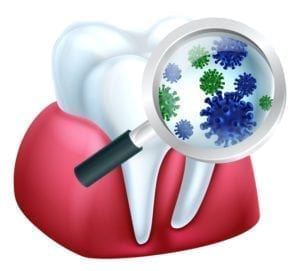One question that comes up in our practice often and we often hear is, “How did I get a cavity”? The answer is not always simple, but we tell patients that there are 4 things you must have to get a cavity. And it is not that they have “soft teeth”. Except for a few genetic diseases, everyone has the same hardness of teeth. The difference comes in how the 4 things you have to have a cavity interact in your mouth. Dr. Greg Reece of Dentistry of the Queen City provides them below:
- A Tooth – Although this sounds like a joke, it is a fact. You cannot get a cavity if you don’t have a tooth or teeth.
- Bacteria – In everyone’s mouth exist the bacteria to form cavities. While some people have more bacteria than others, we all have it. The cleaner we keep our teeth and mouth, the fewer bad bacteria present. Also, the more cavities you have and the more severe the decay, the more bacteria will be in your mouth.

- Food Source – The bacteria must have a food source to cause a cavity. Their food source is sugar, and their waste product is acid. That acid is what dissolves the tooth structure and causes a cavity. The main thing people think about when they hear the word sugar is candy and soda. Yes, those are the big ones, but it is any fermentable carbohydrate. This includes pasta, bread, rice, fruit, crackers, etc. It does not take much for those big carbohydrates and starches to break down into simple sugars that the bacteria can eat.
- Time – The amount of time the bacteria come in contact with the food source plays a big part. While your normal saliva has a pH of around 6, when you ingest and eat sugars, the bacteria will produce acid as they eat the sugar. If this happens regularly, then the pH of your mouth will drop below 5.5. This is the critical point in forming a cavity. The more frequently you ingest sugary foods and drinks, your mouth will stay at an acidic level conducive to tooth decay. People who tend to “graze” on cariogenic (cavity-causing) food throughout the day and people who sip on drinks with sugar will constantly give the bacteria their food source. This means they’re keeping their mouth at or below that critical level for a long enough period of time to cause a cavity.
Aside from these 4 things, another thing that can play a part in it is saliva flow. Saliva is there to do many things for you. It helps you wash away food particles from your mouth, mix with food as you chew to make it easier to swallow, and buffers the acidity in your mouth.
This plays a key role in some people getting cavities. If a person suffers from xerostomia (dry mouth), they will be more prone to cavities because they cannot do all the above.
Another thing to factor in is the acidity of the food you eat. If you ingest many acidic foods, it will keep your mouth at a lower pH, and you will be more prone to cavities. Drinking lots of water, especially after eating or drinking something very acidic, will help to buffer the acidity quicker and keep your mouth at a healthy pH.
So how do we put this information to use? We need to limit the number of fermentable carbohydrates we ingest and the time in which they contact our teeth. We have to be mindful of what we eat and how frequently throughout the day we eat it. And one final thing we can do is brush and floss. The cleaner we keep our teeth, the fewer bacteria cause a cavity!
Sometimes knowing more about the process can make it easier to fight the problem. So now you can put this knowledge to use, and your next 6-month check-up can be cavity-free! Call us today or schedule an appointment online!
